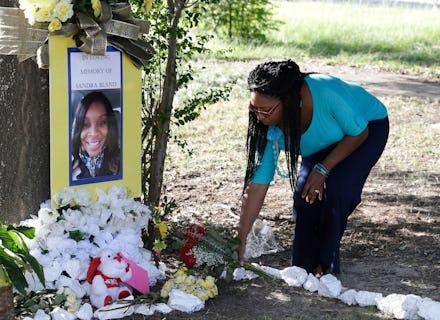Sandra Bland’s cellphone video of traffic stop raises new questions about her arrest

Newly discovered video footage recovered from Sandra Bland's cellphone has appeared after a Texan nonprofit news outlet, the Investigative Network, publicized their findings on the Dallas television station, WFAA. In contrast to the trooper's dashcam footage, the recording puts viewers into Bland's shoes as she confronts the officer, Trooper Brian Encinia, making the arrest. The trooper's actions and behavior during the recording has called into question his claims of fearing for his safety during his encounter and confrontation with Bland.
In the video, Bland grabs her cellphone in the passenger seat to record as she argues with the officer's reason for arrest. She can be heard repeatedly asking why she's being apprehended and verbally stating that Encinia opened her car door to threaten her. After a brief, tense moment, the officer quickly takes out his stun gun and screams at her, demanding she exit the vehicle. Bland reluctantly complies as she leaves her car while holding her phone and declares she's ready to take the matter to court. The trooper notices the phone in her hand and begins to repeatedly demand she put it down. After some resistance, she takes the phone back to her car before the video ends.
What started as a "failure to signal" traffic stop in 2015 ended tragically when Bland was found dead in jail in an apparent suicide. The dashcam footage taken from the arresting officer's vehicle, which captures what should have been a non-violent encounter, ignited a nationwide debate about law enforcement and the lack of deescalation techniques practiced by the police. The incident also spurred the creation of the Sandra Bland Act in Texas, which requires deescalation training for officers, provides protections for arrested individuals with mental health issues, and requires independent investigations into deaths that occur in jail.
During his interviews with investigative officials, Encinia, stated he feared for his safety and made an appropriate arrest. A grand jury concluded he lied about this statement — that he arrested Bland because he was angry about her refusal to put out her cigarette — and indicted him for perjury. The prosecuting team dropped the charge in exchange for his promise that he would not work in law enforcement ever again. With no other charges, Encinia walked away from the incident without jail time.
The new video opens up more questions about his claims about his safety as well as whether the Texas Department of Public Safety (DPS) hid this video from the victim's family and the grand jury. Cannon Lambert, the Bland family's lawyer, told The New York Times that neither he nor the family saw the footage. He also wonders why the video wasn't brought by prosecutors as evidence of perjury.
“So if the video showed that he had no basis of being in fear of his safety," Lambert said, "and he lied about that, then you would think they would be using that video."
Officials for the DPS dispute the idea that the video was withheld from Bland's family. The agency says the video was part of a package of evidence sent to the victim's family during the discovery process. However, WFAA notes any mention of a cellphone video is "buried more than 60 pages into the document."
Chip Lewis, Encinia's attorney, has also brushed off the accusations of withholding evidence. In a statement to the Associated Press, he claimed the cellphone video did not show anything different from what the dashcam already showed — that the trooper feared his life from the gestures the victim made within the car.
The discovery has members of Bland's family calling for another investigation into the case. Shante Needham, the victim's sister, told WFAA that she believes the recording "not only shows that [Encinia] lied, but that he really had no business even stopping her, period.”
She believes "at the end of the day, he needs to go to jail.”